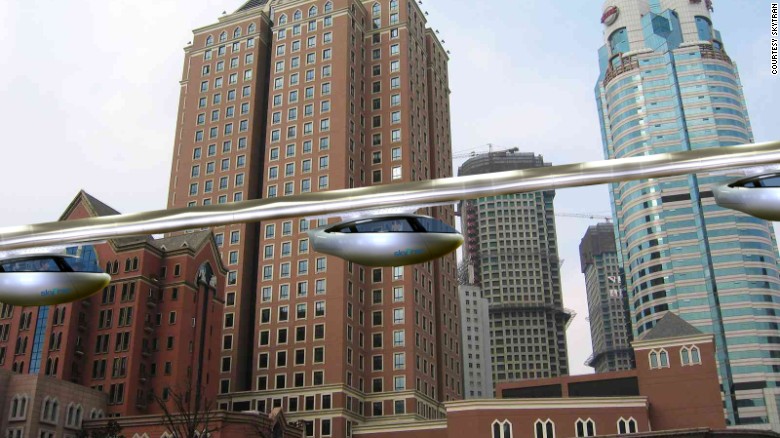Driverless pods, gliding above city streets using a network of elevated guideways. This is SkyTran -- but is it the future?
SkyTran wants to do away with train schedules and central stations to develop a grid system above the ground with multiple "off ramps" acting as stations where users can board pre-booked pods -- a cab service for the skies.
Call for SkyTran on your smart phone and a computer-controlled, magnetically levitating pod arrives. It will whisk you across the city to your destination.
"The next big innovation is going to be in automated transit," says John Cole, SkyTran CTO and director. "Transportation will just recede into the background of lives, as something that just happens automatically. I think about where I want to go, tell a computer where I want to go and it just takes me there -- seamlessly."
Driverless pods whisk you across town 01:43
SkyTran says the technology uses only a third of the electricity used by one of today's hybrid cars because its vehicles weigh just 300 pounds.
The first pilot project will be at the campus of Israel Aerospace Industries, on the outskirts of Tel Aviv. The 400-meter demonstration system is planned for completion by late 2015, with the hope of getting the certification needed to build 20 kilometers of track in Tel Aviv for public use within three years. And there are hopes to expand into cities across Europe and Asia.
Building traditional urban roads and railways is expensive and requires available land -- a precious commodity in many cities. One way around that is to go underground, with subway systems serving populations well in cities throughout the world -- but at great cost.
"We can build on sidewalks, buildings, anywhere really and create a whole host of stations for people to choose from" says Skytran CEO Jerry Sanders, who adds that his system can be built for $10 million per mile. But is going up really the way forward?
Joe Dignan is a smart cities expert based in the United Kingdom. As he sees it, there's a rosy horizon for SkyTran's automated, personalized transit. "The litmus test is, would you use it yourself? And I would certainly use it.
"I can see it very much useful for emerging economies and particularly cities that are developing from scratch."
Ryan Chin is managing director of the City Science Initiative at MIT. He says, "Personal Rapid Transit systems like this one in the last several years may make sense in some limited applications like an expansive airport, university/corporate campus, or something like an expo (take Shanghai or Dubai)."
But Chin is concerned that systems like this only add extra infrastructure to the environment. "The construction and operation of the SkyTran infrastructure is not an inexpensive proposition considering you need to have stations that bring people up and down, and in places that don't have enough urban density this will be too far for people to walk to and from and likely remain car dependent."
For Sanders, however, if all goes to plan, commuters in congested cities around the world could ditch their cars and timetables and see their transportation tailored to suit their schedules -- the opposite of today's commuting trauma. "Being stuck in traffic is just the most stress-inducing, soul-crushing part of society today," says Sanders. "We really want to make people's lives better and elevated, high-speed transportation is the answer."
(CNN)
ANN.Az







Follow us !











